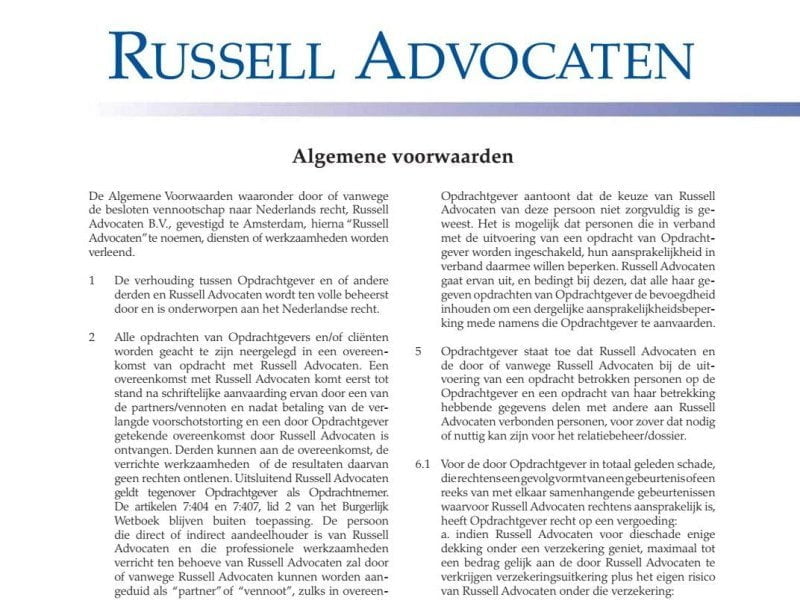Reinier advises national and international companies
reinier.russell@russell.nl +31 20 301 55 55Liability for damage can lead to high compensation payments. Is it possible to exclude liability completely, or can it merely be limited? And what measures do you have to take to do so?

This is one of the most common questions we are asked by entrepreneurs. The question is obvious, as liability for damage can lead to high compensation payments. So is it possible to exclude liability completely, or can it merely be limited? And what measures do you have to take to do so?
In contracts you can lay down what you will or won’t be liable for. As it is inefficient to negotiate each contract separately, General Terms and Conditions are an efficient solution for standard limitations.
A clause included in the General Terms and Conditions which limits or excludes liability is called an exoneration clause. An exoneration clause must be drawn up correctly and its content has to be accurate as well. Otherwise, there is a high risk that the clause will not be (fully) valid and thus liability would not be excluded after all.
The requirements for an exoneration clause are (partly) stipulated by law:
In order to assess the validity of an exoneration clause, the Court will not just consider the statutory requirements but also the circumstances of a specific situation. For instance,
An exoneration clause can limit your liability extensively, provided that certain requirements are met. A clause that limits liability to too great an extent can be declared void. By this you will also be held liable for matters you could have excluded.
If you intend to exclude liability, you will have to take the following steps:
In the event an exoneration clause is invoked, check whether all (legal) requirements have been met and if the exoneration clause may be declared void.
Would you like to know more about the exclusion of liability, drafting contracts and/or General Terms and Conditions? Please contact:
Reinier W.L. Russell, LL.M. (reinier.russell@russell.nl).
Wednesday 25 September 2024, Reinier Russell will discuss cybersecurity and data protection in litigation at the European meeting of the World Litigation Forum in Barcelona.
Expedited liquidation is a quick way to terminate a legal entity. However, the scheme was also abused, disadvantaging creditors. A new law should prevent this. What requirements does an expedited liquidation have to meet from now on? And what options do creditors have to collect their claims?
In his interview on “Hidden Gems – Treasured artwork adds to allure of Netherlands”, Reinier Russell talks about how artworks still reflect the spirit of the Golden Age and where they can be found.
Entrepreneurs may have various reasons for ending their businesses. Expected profits may be disappointing, retirement may be approaching or a partnership (joint venture) may be ending. What should entrepreneurs bear in mind when terminating a business?
A new EU regulation requires anyone wishing to import cultural goods into the EU to have an import license or submit an importer’s declaration. When is which type of document required? How does it affect art dealers, galleries, auction houses and collectors, both inside and outside the EU?
In principle, the enforcement of foreign judgments is a national matter. But what if a dispute has already been dealt with by a foreign court? Can such a foreign judgment be enforced in the Netherlands or not?